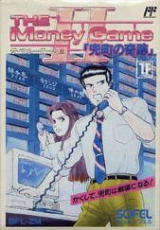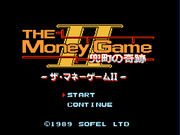
The Money Game II: Kabutochou no Kiseki
Encyclopedia
is a Nintendo Family Computer
game that is about investing money in the stock market
.
 All the benefits from the original Money Game are here. Like in the real stock market, the player must buy a stock at a low price and sell the stock when he feels that it is high enough to garner him a huge profit. The game's artificial intelligence
All the benefits from the original Money Game are here. Like in the real stock market, the player must buy a stock at a low price and sell the stock when he feels that it is high enough to garner him a huge profit. The game's artificial intelligence
can manipulate the game's "economy
" at any time causing either periods of mass economic growth, simulating periods of both economic boom and periods of economic recession
.
The player controls a Japanese salaryman
who must make more money through the stock market to impress his female significant other
. Since the days of the week are done in Japanese, players must know the days of the week in written Japanese. Weekends are spent using cash to buy treats for the house and for the spouse. At the beginning of the game, the wife is angry at the player because he refuses to make more money for his family. Achieving certain goals will improve quality of life as more luxuries can be purchased.
. The story line is different but the layout and the scheme of the office
is almost exactly the same as in the North American release.
Only cosmetic changes were made to make it relevant with the North America
n audiences; the part about the rich uncle dying and the nephew and showering his girlfriend with gifts until she becomes his trophy wife
may be garnishings added on by the Nintendo of America localization team. These changes were probably inspired by 1980s movies with a rags to riches
theme to it. Both of these games expect the player to exercise his avatar and go out on dates.
Nintendo Entertainment System
The Nintendo Entertainment System is an 8-bit video game console that was released by Nintendo in North America during 1985, in Europe during 1986 and Australia in 1987...
game that is about investing money in the stock market
Stock market
A stock market or equity market is a public entity for the trading of company stock and derivatives at an agreed price; these are securities listed on a stock exchange as well as those only traded privately.The size of the world stock market was estimated at about $36.6 trillion...
.
Summary

Game artificial intelligence
Game artificial intelligence refers to techniques used in computer and video games to produce the illusion of intelligence in the behavior of non-player characters . The techniques used typically draw upon existing methods from the field of artificial intelligence...
can manipulate the game's "economy
Economy
An economy consists of the economic system of a country or other area; the labor, capital and land resources; and the manufacturing, trade, distribution, and consumption of goods and services of that area...
" at any time causing either periods of mass economic growth, simulating periods of both economic boom and periods of economic recession
Recession
In economics, a recession is a business cycle contraction, a general slowdown in economic activity. During recessions, many macroeconomic indicators vary in a similar way...
.
The player controls a Japanese salaryman
Salaryman
refers to someone whose income is salary based; particularly those working for corporations. Its frequent use by Japanese corporations, and its prevalence in Japanese manga and anime has gradually led to its acceptance in English-speaking countries as a noun for a Japanese white-collar...
who must make more money through the stock market to impress his female significant other
Significant other
Significant other is colloquially used as a gender-blind term for a person's partner in an intimate relationship without disclosing or presuming anything about marital status, relationship status, or sexual orientation, as it is vague enough to avoid offense by using a term that an individual...
. Since the days of the week are done in Japanese, players must know the days of the week in written Japanese. Weekends are spent using cash to buy treats for the house and for the spouse. At the beginning of the game, the wife is angry at the player because he refuses to make more money for his family. Achieving certain goals will improve quality of life as more luxuries can be purchased.
Similarities to Wall Street Kid
This game is considered to be the Japanese version of Wall Street KidWall Street Kid
Wall Street Kid is a video game for the Nintendo Entertainment System.The player must prove himself worthy by taking $500,000 in seed money in order to gain a six-hundred-billion-dollar inheritance from the extremely wealthy Benedict family...
. The story line is different but the layout and the scheme of the office
Office
An office is generally a room or other area in which people work, but may also denote a position within an organization with specific duties attached to it ; the latter is in fact an earlier usage, office as place originally referring to the location of one's duty. When used as an adjective, the...
is almost exactly the same as in the North American release.
Only cosmetic changes were made to make it relevant with the North America
North America
North America is a continent wholly within the Northern Hemisphere and almost wholly within the Western Hemisphere. It is also considered a northern subcontinent of the Americas...
n audiences; the part about the rich uncle dying and the nephew and showering his girlfriend with gifts until she becomes his trophy wife
Trophy wife
Trophy wife is an expression used to describe a wife, usually young and attractive, who is regarded as a status symbol for the husband, who is often older and affluent.-History:The term's etymological origins are disputed...
may be garnishings added on by the Nintendo of America localization team. These changes were probably inspired by 1980s movies with a rags to riches
Rags to riches
Rags to Riches refers to any situation in which a person rises from poverty to wealth, or sometimes from obscurity to fame. This is a common archetype in literature and popular culture ....
theme to it. Both of these games expect the player to exercise his avatar and go out on dates.

